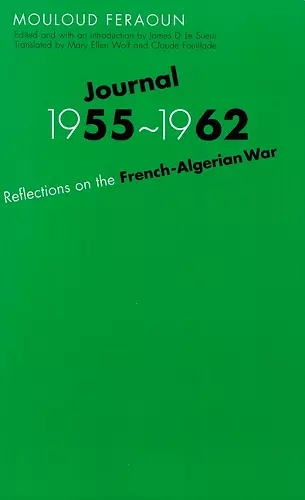Journal, 1955-1962
Reflections on the French-Algerian War
Mouloud Feraoun author Mary Ellen Wolf translator Claude Fouillade translator James D Le Sueur editor
Format:Paperback
Publisher:University of Nebraska Press
Should be back in stock very soon

Feraoun's Journal captures the heartbreak of a writer profoundly aware of the social and political turmoil of the time
Gives an account of everyday life in Algeria during decolonization. This journal captures the heartbreak of a writer profoundly aware of the social and political turmoil of the time. It is suitable for those interested in the history of European colonialism and the tragedies of contemporary Algeria.“This honest man, this good man, this man who never did wrong to anyone, who devoted his life to the public good, and who was one of the greatest writers in Algeria, has been murdered. . . . Not by accident, not by mistake, but called by his name and killed with preference.” So wrote Germaine Tillion in Le Monde shortly after Mouloud Feraoun’s assassination by a right wing French terrorist group, the Organisation Armée Secrète, just three days before the official cease-fire ended Algeria’s eight-year battle for independence from France.
However, not even the gunmen of the OAS could prevent Feraoun’s journal from being published. Journal, 1955–1962 appeared posthumously in French in 1962 and remains the single most important account of everyday life in Algeria during decolonization.
Feraoun was one of Algeria’s leading writers. He was a friend of Albert Camus, Emmanuel Roblès, Pierre Bourdieu, and other French and North African intellectuals. A committed teacher, he had dedicated his life to preparing Algeria’s youth for a better future. As a Muslim and Kabyle writer, his reflections on the war in Algeria afford penetrating insights into the nuances of Algerian nationalism, as well as into complex aspects of intellectual, colonial, and national identity. Feraoun’s Journal captures the heartbreak of a writer profoundly aware of the social and political turmoil of the time. This classic account, now available in English, should be read by anyone interested in the history of European colonialism and the tragedies of contemporary Algeria.
"[Feraoun] passionately examines the human condition with all its flaws and nobility, yet he occasionally describes events with an eerie detachment. Since he was assassinated by a French terrorist group just three days before the cease-fire that ended the war, his account is especially poignant. An emotionally draining and important work."-Booklist Booklist "As a chronicle of what the break meant when it was taking place on the village streets and in the countryside, in the homes of the people most directly affected by its endless cruelty, the journal that Feraoun kept, at the urging of his friend Robles, somewhat irregularly, from 1955 until 1961, is indispensable. It is also entirely without philosophical affectation, a profound and concrete commentary on issues that would arise again in the 'north-south' crises in the following decades, of which the Algerian revolution was, on might say, the laboratory. After years of anti-colonial and post-colonial theory, Feraoun's journal is truly refreshing to read. In its pages a genuinely free man reflects on relations of power between the conqueror and the conquered, on the place of intellectuals and teachers in a political war, on the effect of repression and resistance on families and neighbors, friends and communities. The simplicity with which Feraoun approached these terrible events was a literary strategy, a literary accomplishment--and proof that he had a better grasp of the meaning of his country's history than did most commentators in Paris and elsewhere. Keeping his journal, moreover, was an act of courage: people where arrested and killed for less overt expressions of sympathy for the rebellion... [Feraoun and Camus] both learned French with the simplicity and the clarity that characterize that language's best prose: they are the kinds of writers who seem, when you first encounter them, easy to read, and turn out to be far more difficult to understand. They always say much more than you thought they said. This is, of course, one definition of classical literature; and both Camus, who won the Nobel Prize for Literature in 1957, and Feraoun, who is probably the most widely-read French-language Algerian writer of the century (after Camus), were part of the French canon by the late 1950s... Tersely and eloquently, Feraoun summed up in the pages of his journal the injustice of the colonial system, but unlike the Paris intellectuals he did not dwell upon it, preferring to keep notes on what actually happened to actual people with whom he was acquainted... Feraoun's journal became one of the most important books to emerge from the Algerian conflict. It is an essential human document, a real war book... The Algerian war ... remains an unavoidable reference point in the debate over the kind of world we will live in. And this debate was foreshadowed in Feraoun's journal, as in the polemical writings of Camus and Amrouche. For this reason, the publication of this English translation of Feraoun's Journal is very welcome."-New Republic New Republic "Feraoun's painfully candid yet engaging journal of the French-Algerian War constitutes an unusually poignant record of one of Africa's cruelest colonial conflicts and one of twentieth-century France's darkest moments. Journal, 1955-1962 will surely supplant Frantz Fanon as the definitive text on French Algeria in particular and on colonialism in general."-Julia Clancy-Smith, author of Rebel and Saint: Muslim Notables, Populist Protest, Colonial Encounters (Algeria and Tunisia, 1800-1904) -- Julia Clancy-Smith
ISBN: 9780803269033
Dimensions: unknown
Weight: 431g
340 pages